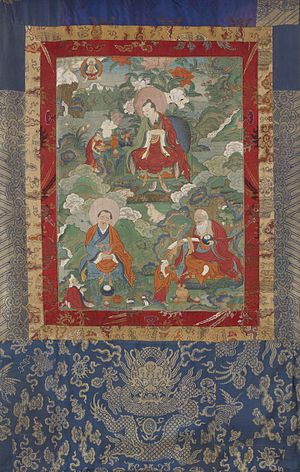Piṇḍola Bhāradvāja
Piṇḍola Bhāradvāja (T. bha ra dhwa dza bsod snyoms len བཧ་ར་དཧྭ་ཛ་བསོད་སྙོམས་ལེན་; C. bintoulu poluoduo zunzhe) was a prominent monk disciple of the Buddha who became an arhat. He was the son of a Brahmin priest and a teacher of the Vedas before encountering the Buddha. When he first became a monk, he carried an extra large alms bowl on his daily alms rounds, so that he could get as much food as possible. Eventually he was able to overcome his avarice and he became an arhat.
Piṇḍola Bhāradvāja became known for his supernatural powers (abhijñā). At one point, he ascended into the air in order to retrieve a bowl from on top of a pole, in response a challenge by a wealthy merchant. Afterwards, he was rebuked by the Buddha for using his supernatural powers for an unworthy cause. This incident prompted the Buddha to establish a rule forbidding monks from displaying supernatural powers in front of the laity.
In the Sanskrit tradition, Piṇḍola Bhāradvāja is recognized as one of the sixteen arhats, all of whom the Buddha requested to delay enterning parinirvana so they could remain in the world to protect his teachings. In the East Asian tradition, Piṇḍola Bhāradvāja is usually listed as the first of the sixteen arhats.
Further reading:
- https://www.wisdomlib.org/buddhism/book/the-great-chronicle-of-buddhas/d/doc364762.html
- https://www.wisdomlib.org/definition/pindola
 Ud 4:6 Piṇḍola (Piṇḍola Sutta), Dhammatalks.org
Ud 4:6 Piṇḍola (Piṇḍola Sutta), Dhammatalks.org- Robert E. Buswell Jr., Donald S. Lopez Jr., The Princeton Dictionary of Buddhism (Princeton: 2014), s.v. Piṇḍola Bhāradvāja
